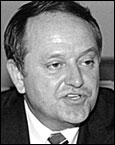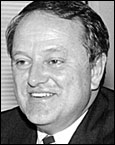 |
 |
|||||
 |
 |
 |
 |
 |
||||||
 |
 |
 |
||||
| Doug Delaney: ‘The Catholic bishops have tried to educate the
Catholic voters to be involved in the process, first and foremost.’
Catholic New World photos by Sandy Bertog |
||||||
|
The Interview, a regular feature of The Catholic New World, is
an in-depth conversation with a person whose words, actions or
ideas affect today’s Catholic. It may be affirming of faith or
confrontational. But it will always be stimulating.
When Catholic voters go to the polls Nov. 7, they are not to leave their consciences at home with their campaign buttons. Instead, according to the U.S. bishops’ quadrennial guide to political issues, “Faithful Citizenship: Civic Responsibility for a New Millennium,” they are to use church teachings and moral principles to help them make their decisions. In the same way, the Illinois bishops use the Catholic Conference of Illinois to voice the church’s position on a variety of issues by lobbying lawmakers and taking public stands. Doug Delaney, executive director of the conference, recently discussed what “Faithful Citizenship” means. Catholic New World: “Faithful Citizenship” makes the case that Catholics should bring their faith to bear on public decisions, including voting. What issues do you think Illinois Catholics should be thinking about when they go to the polls in November? Doug Delaney: I think the first and most important issue is the sanctity of human life, and that goes from conception to natural death. The respect for human life encompasses our entire reason for existence. We take care of the poor, we take care of the elderly, we take care of the vulnerable because they don’t have a voice in the political system. I think the life issues for the church are consistent across the board: abortion, euthanasia and the death penalty. I think that the Catholic bishops have done a fantastic job of making the death penalty a life issue and our governor has. We have a moratorium on the death penalty in Illinois because of the problems with the death penalty. I think it’s also important to look at the entire criminal justice system, because certainly if we’ve found 13 people in Illinois on Death Row who were falsely tried and convicted, there’s got to be a lot of other people with long prison terms who have been falsely convicted. The Catholic Church has education as one of its major emphases. The [Archdiocese of] Chicago school system is the 11th largest school system in the country and in the state of Illinois, there’s over a quarter of a million children in Catholic schools. I think that’s something legislators need to consider. First of all, it’s the wish of the parents and the wish of the people of Illinois to have another education system, and on top of that, it saves the state literally billions of dollars. One out of seven children in Chicago is in a Catholic school, and one out of 10 children in Illinois is in a Catholic school. CNW: Given the variety of issues that there are, do you think it’s possible to talk about such a thing as “the Catholic vote”? DD: No, I don’t think there’s a Catholic vote. The Catholic bishops have tried to educate the Catholic voters to be involved in the process, first and foremost. You have to vote, even if your ideal candidate is not one of the options. It’s important that we look at the issue of the voter the same way we look at the issue of the candidate. We say of political candidates that you can’t have a personal position and not carry that with you into political office. For example, you cannot say “I’m pro-life, but it’s not my position to carry that into the political arena.” The same thing goes with people who are voting. They have to look at the position of the candidates and decide when they vote for them, where is this person going to be on these issues? It’s a difficult task. CNW: How well prepared do you think voters are, and what can they do to be better prepared? DD: I think that people are pretty well prepared. The thing that concerns me is that they may be too influenced by the media. I think that people need to find some independent positions. They need to find documents like “Call to Faithful Citizenship” or attend forums where questions are asked of the candidates. If we just basically go by what the [secular] media says, I think we’re not getting the full picture. … We at the Catholic Conference have sent copies of “Faithful Citizenship” to more than 400 state and federal candidates who are on the ballot in Illinois, and we encourage voters to call the candidates and ask about the issues “Faithful Citizenship” talks about. CNW: What if somebody looks at all the candidates and evaluates all their positions and decides that the one they really want to vote for is a third or fourth party candidate who really has no realistic chance of winning? Is that a wasted vote? DD: I don’t think any vote is a wasted vote. If that person feels that’s the best place to cast their ballot, then I think they should. We do have a very powerful two-party system, but there are some instances where independent candidates or other party candidates have won elections. I think that one of the reasons most people say they don’t vote is the two parties are the same. CNW: The presidential election is getting the lion’s share of the attention right now, but we also have legislative and congressional races coming up. What issues is the Catholic conference going to be working hardest on in the next year or two? DD: First and foremost, the conference’s agenda is based on a preferential option for the poor, so we will continue to try to take care of the most vulnerable. Certainly we’ll be looking at the area of education, and how can we help parents—especially, once again, poor parents—who have chosen an education for their children that’s not in the public school system. We also have been supportive of equitable and fair funding for the public school system. I think sometimes the rhetoric is that the Catholic school system wants to take money away from the public school system. Our position is to fully fund the public school system, and then help those parents who want to make the choice to send their child to another school, to a Catholic school specifically. Health care is always going to be an issue, and how do we provide health care for those who have no health care. As a Catholic Church, we need to make sure that we’re taking care of immigrants that are coming into this country, especially children and the elderly, those who are least able to make their way. We need to provide adequate funding for our Catholic Charities and social service agencies—that’s an ongoing fight we have every year, to try and increase the money we get from the state to provide these services. CNW: We have the tuition tax credit in Illinois. Do you see a push for vouchers or are we not ready for that yet? DD: Well, I don’t know if it’ll actually be a voucher. There’s other ways of getting money for our schools. That’s a political climate that I think needs to be developed by someone other than the Catholic Church. Certainly, the Catholic Conference will support vouchers, the cardinal supports vouchers. The question is, who’s going to lead the charge? If the Catholic Church brings a voucher initiative forward, it’s easier to defeat because it’s a self-serving self-interest issue. If, for example, we could get the business community and business leaders in Chicago and throughout Illinois to say it’s important to have two education systems. It makes both of them stronger. We need to support the public school system, but it’s also advantageous for us to have children coming out of another school system, a non-public school system, whether it’s Catholic, Lutheran, Jewish or non-sectarian. In some instances, it’s better for the child to be in an alternative education system. I don’t think that fact can be debated. It’s just a matter of how we approach the issue. The fact is non-public schools save the state and the taxpayers a lot of money, and I think that we’ve successfully convinced the legislature of that with some of the programs we’ve been able to pass in Springfield. I think it’s going to be an issue for a long time. There are voucher issues on the ballot in Michigan and California. We’ll look at those and see if the time is right in Illinois for a voucher initiative. CNW: If we do see a voucher initiative, do you see it being something statewide or something that targets families and children in struggling schools? DD: There are lots of options. To me it would seem to be most advantageous to help the poor. If wealthy people decide to send their children to a non-public school, they can make that choice. Those who are poor are the least able to make that choice. What we need to do is have the representatives who represent those individuals in the legislature support that program. That’s where our work is cut out for us: to convince those who represent those of less means to be able to choose an alternative education if they want.
Front Page | Digest | Cardinal | Interview |
||||||